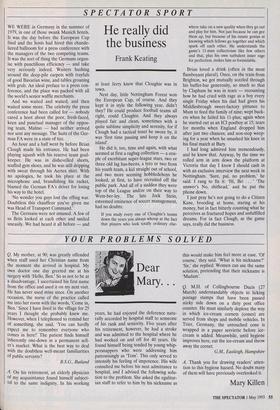SPECTATOR SPORT
He really did the business
Frank Keating
WE WERE in Germany in the summer of 1979, in one of those swank Munich hotels. It was the day before the European Cup final and the hosts had hired this chande- liered ballroom for a press conference with the managers of the two competing teams. It was the sort of thing the Germans organ- ise with punctilious efficiency — and take very seriously indeed. Waiters hushing around the deep-pile carpets with trayfuls of good Bavarian wine, and tables groaning with grub. An ideal preface to a press con- ference, and the place was packed with all the world's senior waffle merchants.
And we waited and waited, and then waited some more. The celebrity the press conference had been called for — nobody cared a hoot about the poor, fresh-faced, keen and punctual manager of the oppos- ing team, Malmo — had neither arrived nor sent any message. The Suits of the Ger- man FA were in a state of tizz.
An hour and a half went by before Brian Clough made his entrance. He had been playing squash with his reserve team goal- keeper. He was in dishevelled shorts, scuffed gym shoes, and he was still dripping with sweat through his Aertex shirt. With no apologies, he took his place at the microphone and, brandishing his racket, blamed the German FA's driver for losing his way to the hotel.
`No wonder you guys lost the effing war. Doubtless this chauffeur you've given me was Head of Transport Command.'
The Germans were not amused. A few of us Brits looked at each other and smiled uneasily. We had heard it all before — and at least Jerry knew that Cloughie was in town.
Next day, little Nottingham Forest won the European Cup, of course. And they kept it in style the following year, didn't they? He could produce football teams all right, could Cloughie. And they always played fair and clean, sometimes with a quite sublime simplicity and serenity, for if Clough had a tactical tenet he swore by, it was 'first time passing and keep it on the island'.
He did it, too, time and again, with what seemed at first a ragbag collection — a cou- ple of exorbitant super-league stars, two or three old lag has-beens, a tyro or two from his youth team, a kid straight out of school, and two more seeming hobbledehoys he looked, at first, to have recruited off the public park. And all of a sudden they were top of the League and/or on their way to Wem-ber-ley. The late Jock Stein, esteemed eminence of soccer management, had no doubts:
If you study every one of Cloughie's teams down the years you always whoop at the fact that players who look totally ordinary else-
where take on a new quality when they go out and play for him. Not just because he can gee them up, but because of his innate genius at knowing which fellows go together and which spark off each other. He understands the game's 11-man collectivism like few others and that, plus his own turbulent inner rage for perfection, makes him so formidable.
Brian loved a drink (often in the most flamboyant plural). Once, on the train from Brighton, we got mutually sozzled through his buffet-bar generosity, so much so that by Clapham he was in tears — recounting how he had cried with rage as a boy every single Friday when his dad had given his Middlesbrough sweet-factory pittance to Mum to feed the family of nine; wept buck- ets when he failed his 11-plus; again when he started out as an ICI postboy at 15; tears for months when England dropped him after just two chances; and non-stop weep- ing for a year when he smashed his knee in his final match at Bury.
I had long admired him tremendously, and he knew that. Anyway, by the time we rolled arm in arm down the platform at Victoria that day I knew I should cash in with an exclusive interview the next week in Nottingham. 'Sure, pal, no problem,' he said. I rang to fix it: 'Hi, Bri . . . "The answer's No, shithead,' and he put the phone down.
I just pray he's not going to do a Citizen Kane, brooding at home, staring at his money, but in fact bitterly counting what he perceives as fractured hopes and unfulfilled dreams. For in fact Clough, as the game says, really did the business.


























































 Previous page
Previous page